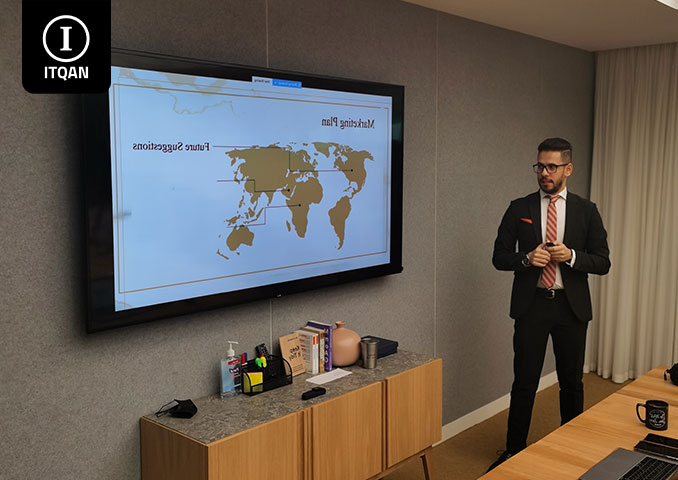
05 May Conditions for an investor’s residency in the Emirates
The United Arab Emirates is one of the leading investment destinations in the world, as it provides a developed investment environment and business incubator that attracts investors from around the world. One of the leading consulting companies in this field is Itqan, which provides specialized legal and financial consulting services to investors who wish to invest in the Emirates.
This comprehensive article aims to review the conditions for an investor’s residency in the Emirates in cooperation with Itqan Company. The article will discuss the legal information and guidance that investors need to begin the investment process and obtain residency in the Emirates.
Several important aspects will be covered in the article, starting with the types of visas available to investors, the conditions for an investor’s residency in the Emirates to obtain them, all the way to the financial and legal requirements that must be met. We will also review the advantages and benefits that investors can benefit from when investing in the UAE, including legal protection, financial facilities, and access to regional and global markets.
Furthermore, Itqan will provide detailed information about its role in helping investors achieve their goals of investing in the UAE. The company will explain the services it provides and how it can help investors complete the legal and financial procedures related to investment and obtain valid residency.
Ultimately, this article will be a comprehensive reference for investors who aim to invest in the UAE and obtain valid residency. Investors will be provided with the necessary information and legal guidance they need to make informed investment decisions and implement them successfully.

Conditions for an investor’s residency in the Emirates
Conditions for an investor’s residency in the Emirates
Conditions for an investor’s residency in the Emirates may vary between different emirates, but in general, there are some general conditions that may include:
- Financial investment: Obtaining an investor residence visa can require a specific financial investment in the emirate, and this investment can be in real estate, stocks, businesses, etc.
- Type of company: If an investor wishes to set up a company, there may be specific requirements for the type of company and the size of the investment.
- Criminal Record: The investor may be asked to provide a clean criminal record certificate from their country of origin or from the country in which they previously spent time.
- Health Insurance: There may be requirements to obtain health insurance for the investor and his family as a condition of residency.
- Economic function: Some emirates can require the investor to have a specific economic function or to contribute to the local economy in a certain way.
- Conditions for temporary residence: There may be different conditions for temporary and permanent residence, with the conditions being the most stringent for permanent residence.
Types of residence visas available to investors in the UAE
Several types of residency visas are available for investors in the United Arab Emirates , and they vary according to the value of the investment, the type of company and the economic sector in which the investment is made. There are some common types of residence visas for investors in the UAE include:
- Founder Investor Visa: Granted to individuals who own an ownership stake in a specific company in the Emirates, and requires a specific investment according to the conditions of the competent government authority.
- Real Estate Investor Visa: Granted to individuals who invest in real estate at a certain value, and its conditions vary between different emirates.
- Industrial or Commercial Sector Investment Visa: Allows individuals who invest in industry or trade to access a specific residence visa.
- Secondary Investment Visa: Individuals who invest in specific investment projects or funds can obtain this type of visa.
Necessary requirements to obtain a residence visa as an investor
The requirements necessary to obtain a residency visa as an investor in the UAE vary depending on the type of visa and the emirate you wish to invest in, but there are some general requirements that are usually common:
- Type and value of investment: The investor must provide evidence of the proposed investment and its value, whether it is in a specific company, in real estate, or in a specific sector, depending on the type of visa he wishes to obtain.
- Business Plan: The investor must submit a detailed business plan explaining the financial and operational objectives and strategies for the proposed project.
- Citizenship of local partners: If the investment requires a local partnership, there may be special requirements relating to local partners.
- Health Insurance: It is usually necessary to provide health insurance for the investor and his family.
- Clean Criminal Record: The investor may be asked to provide a clean criminal record certificate from their country of origin or from the country in which they reside.
- Payment of fees and costs: The prescribed fees must be paid to submit the visa application and complete the necessary procedures.
- Proof of residence: In some cases, the investor may be asked to provide proof of permanent residence in the emirate.
Tax benefits for investors in the UAE
The United Arab Emirates is considered among the preferred investment destinations for investors due to several tax benefits and favorable financial legislation. These are some of the tax benefits that the Emirates offers to investors:
- Not imposing taxes on personal income: In most regional emirates, the government does not impose taxes on the personal income of citizens and residents.
- Not charging value-added tax (VAT): The UAE does not charge VAT on many goods and services, making it a preferred destination for trade.
- Availability of bilateral tax agreements: The UAE has signed many bilateral tax agreements with many countries, enabling investors to avoid double taxation and keep a significant portion of their profits.
- Non-taxation of corporate profits: In some cases, companies in some sectors are exempt from paying income taxes for a specified period, which encourages investment.
- Advanced financial facilities: The UAE provides an advanced financial infrastructure, including modern banking facilities and an advanced financial system.
- Flexibility of financial and tax legislation: The UAE has great flexibility in financial and tax legislation, which allows investors to implement different financial strategies effectively.
At the conclusion of this comprehensive article about the conditions for investor residency in the Emirates, in cooperation with Itqan Company, we reiterate that the United Arab Emirates is considered a distinguished investment destination that attracts investors from all over the world. The availability of an incubating and advanced business environment, along with legal protection and financial facilities, makes investing in the UAE a fruitful and reliable investment opportunity.
Through Itqan, investors can benefit from the experience and specialization that the company provides in the field of legal and financial consulting. Itqan provides various services, including advice on establishing companies, business licensing, and financial and legal planning, making it easier for investors to achieve their investment goals and obtain residency in the UAE in an efficient and reliable manner.
Expected costs of obtaining a residency visa for an investor in the UAE
The expected costs of obtaining a residence visa for an investor in the UAE are variable based on several factors, including the type of visa, the size of the investment, the legal quality of the company, and the ancillary services that the investor may need to use. Here is a list of approximate costs you can expect:
- Visa fees: Residence visa fees for investors in the UAE range from several thousand UAE dirhams to several tens of thousands, depending on the type of visa and its validity period.
- Registration and establishment fees: Registration and establishment fees vary depending on the type of company and the emirate in which the establishment process takes place. These fees may include registration fees, licensing fees, and fees for other administrative services.
- Legal consultation fees: Investors may require legal advice to help them understand legal procedures and local legislation, and this service may incur additional costs.
- Administrative services fees: Some administrative procedures may require the payment of additional administrative fees to the relevant authorities, such as the Department of Economic Development and other government bodies.
- Accommodation and Housing Costs: Accommodation and housing costs should also be taken into consideration, as rental and living costs vary greatly depending on location and type of accommodation required.
- Health insurance fees: It is necessary to obtain health insurance for the investor and his family, and this entails additional costs.
- Transportation and travel costs: There may be costs for travel and transportation to and from the Emirates and for moving within the country to complete the necessary procedures.
- Medical examination costs: In some cases, investors may be required to undergo a medical examination, and this service may involve additional costs.

How to establish an investor in the Emirates
How to establish a successful business and obtain residency in the Emirates
To establish a successful business and obtain residency in the Emirates, the following steps can be followed:
- Market Study: Study the local market to identify opportunities and identify unmet needs and promising areas for investment.
- Formulating a business plan: Developing a comprehensive business plan that includes goals, strategies, financial analysis, and marketing plans.
- Determine the company type: Choose the appropriate company type for your activity, such as a local company, a free zone company, or a foreign company.
- Registration and licenses: Register the company and obtain the necessary licenses from the relevant authorities in the emirate of your choice.
- Financial investment: Calculate the financial costs necessary to establish and operate the company and secure the necessary financial resources.
- Investment Visa: Some emirates may require applying for an investment visa before establishing a company.
- Starting the business: Once you obtain the necessary licenses and permits, start operating the business and effectively implement the business plan.
- Obtaining residency: After successfully establishing the business, it may be possible to apply for an investor residence visa.
- Compliance with Laws and Regulations: Ensure compliance with all local laws and regulations related to your business, including tax, labor, health and safety, and more.
- Growth and Expansion: Monitor company performance, explore expansion opportunities, and improve operations to achieve sustainable success.
At the conclusion of this comprehensive article about the conditions for investor residency in the Emirates, in cooperation with Itqan Company, we reiterate that the United Arab Emirates is considered a distinguished investment destination that attracts investors from all over the world. The availability of an incubating and advanced business environment, along with legal protection and financial facilities, makes investing in the UAE a fruitful and reliable investment opportunity.
Through Itqan, investors can benefit from the experience and specialization that the company provides in the field of legal and financial consulting. Itqan provides various services, including advice on establishing companies, business licensing, and financial and legal planning, making it easier for investors to achieve their investment goals and obtain residency in the UAE in an efficient and reliable manner.
Ultimately, investing in the UAE requires compliance with specific legal and financial conditions and requirements. Investors should review the competent authorities and obtain appropriate legal advice to ensure full compliance and success in the investment process.
We hope that this article has provided you with a comprehensive and useful overview of the conditions for investor residency in the Emirates in cooperation with Itqan Company. If you would like to know more information or obtain legal and financial advice tailored to your case, we advise you to contact Itqan Company or the competent authorities to obtain the necessary assistance.
The most important frequently asked questions regarding investor residency in the Emirates
What types of visas are available to investors in the UAE?
Visas available to investors in the UAE include Founder Investor Visa, Real Estate Investor Visa, Industrial or Commercial Sector Investment Visa, Secondary Investment Visa, etc.
What are the requirements to obtain a residence visa as an investor?
The investor must provide proof of the proposed investment and its value, a detailed business plan, health insurance, and a clean criminal record, in addition to paying the prescribed fees.
What tax benefits are available to investors in the UAE?
The UAE offers many tax benefits such as not imposing taxes on personal income and not imposing value-added tax on many goods and services.
What are the laws and regulations that must be adhered to?
Must adhere to labor, corporate, tax, and other laws, and check local regulations and laws regularly to ensure compliance.
What are the most attractive economic sectors for investment?
The UAE’s main economic sectors include real estate, tourism, retail, manufacturing, technology and financial services.



